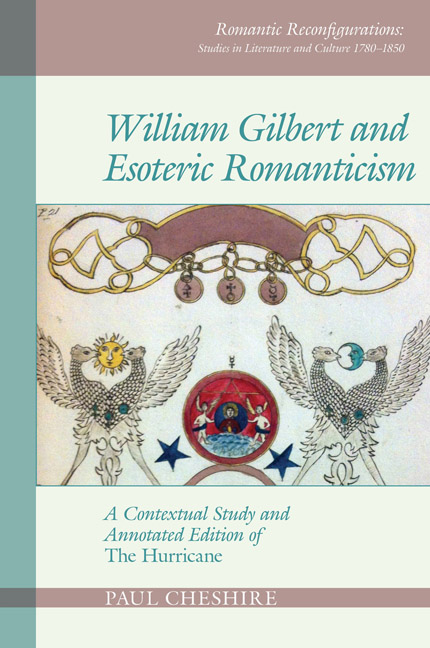 William Gilbert and Esoteric Romanticism
William Gilbert and Esoteric Romanticism from Part Two - The Hurricane
All that is obscure here, I am ready at any hour, to explain to the meek.’
William GilbertThe Problem with Allegory
Chapter 6 looked at Gilbert's structure of Hermetic geography, the underlying metaphysical scheme of The Hurricane. This interaction of the continents is also represented in what Jonathan Wordsworth has described as its ‘complicated, only-partly-construable […] allegoric narrative’. The mystery of this narrative particularly concerns Elmira, the somewhat ambiguous girl (or young woman), described as a ‘form Divine’ (II: 49–50). Elmira is at first sight an ideal love object appearing in answer to the narrator's prayers (I: 138–41), but the narrator's descriptions of her exceed the normal hyperboles of romantic love, and the suspicion that Elmira is more spirit or angel than human is confirmed when she undergoes a transformation at the end of the poem, and her ascendancy seems to match the development of America the fourth continent as it becomes a triumphant revolutionary force. This is confirmed by the way the American element of air is prominent at the end of the poem, when Elmira emerges reborn from the shelter:
All the Isle, the conquered ocean,
Lay before her …
Her God is in her heart in Love and Bliss;
And through the Isle and air she lives.
(II: 188–9, 192–3)In this passage, the ocean (water: Europe), which drowned Elmira's mother, is defeated by air (the hurricane: America) and becomes the ‘conquered ocean’. Elmira, identified with air (‘through the Isle and air she lives’), is the renewed spirit of America, who has now gained a mysterious god-like supremacy.
The narrative of the poem can be briefly summarised. It begins by describing the European invasion of the Americas, and how the spirits of the natives, slaughtered and subjugated by the invaders, have gathered beneath the sea, building up power that will rebalance the injustice they have suffered. Now arrived at their full strength, they rise up into the air as elemental forces that are to form a hurricane, the signs of whose coming are clear to anyone who knows what to look for.
To save this book to your Kindle, first ensure no-reply@cambridge.org is added to your Approved Personal Document E-mail List under your Personal Document Settings on the Manage Your Content and Devices page of your Amazon account. Then enter the ‘name’ part of your Kindle email address below. Find out more about saving to your Kindle.
Note you can select to save to either the @free.kindle.com or @kindle.com variations. ‘@free.kindle.com’ emails are free but can only be saved to your device when it is connected to wi-fi. ‘@kindle.com’ emails can be delivered even when you are not connected to wi-fi, but note that service fees apply.
Find out more about the Kindle Personal Document Service.
To save content items to your account, please confirm that you agree to abide by our usage policies. If this is the first time you use this feature, you will be asked to authorise Cambridge Core to connect with your account. Find out more about saving content to Dropbox.
To save content items to your account, please confirm that you agree to abide by our usage policies. If this is the first time you use this feature, you will be asked to authorise Cambridge Core to connect with your account. Find out more about saving content to Google Drive.